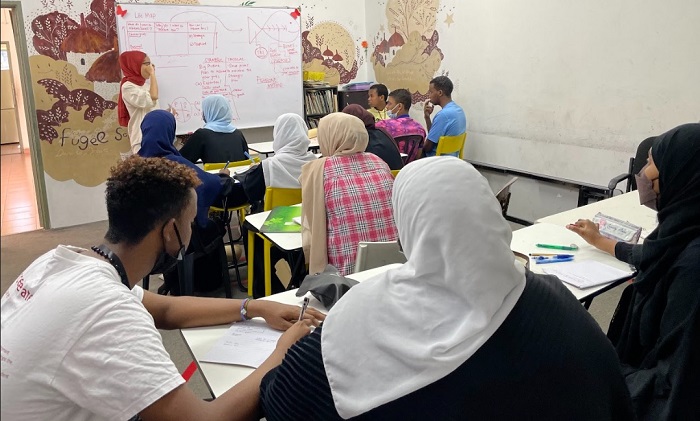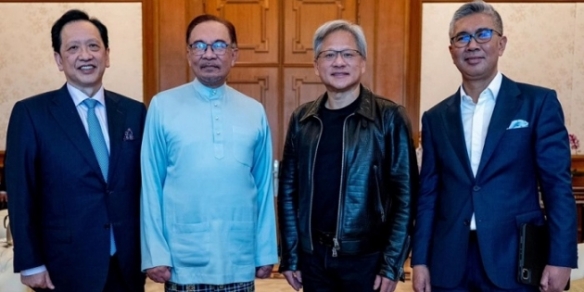Raudhah Nazran focuses on the micro to deliver her vision of 1 mil underprivileged subscribers
By Henry Chang Jie Shen & Karamjit Singh April 26, 2023
- Helping underprivileged youth be independent through upskilling
- Using e-learning app subscriptions to give underprivileged opportunity
“The thing that came to mind while feeding the homeless was how unsustainable it was. How do you help them be financially independent?” Raudhah Nazran pondered. However, as an 18-year old in 2016, she did not have the answer to help the marginalized break out of their chains of poverty.
Nonetheless, it is rare indeed to come across a teenager forming a charity, Khalifa, as she did at such a young age. “I grew up without a father and was raised by a strong mother, who instilled in me the values of giving back,” explained Raudhah of her motivation to launch Khalifa to feed the homeless within the Klang Valley.
She may not have had the life experience and network at 18, to help her figure out the answer to this sustainability issue that was gnawing away at her, but the solution came during her first year of law school in the UK when she learnt about the concept of Social Entrepreneurship. It would change her entire perspective on helping the underprivileged through a sustainable scope and even changed the trajectory of her career.
“I thought that it was a beautiful concept and I rejected a couple of job offers upon graduating to return home,” she said. This had become her calling - to provide functional and life skills to the underprivileged. “Otherwise, they will be stuck in a vicious cycle over and over,” she said.
A key takeaway from her social entrepreneurship experience in the UK revolved around her role as project leader for an entrepreneur program to help former sex trafficking victims from Ghana. Rudhah was struck by the eagerness of the women to not just accept help but offer suggestions to improve the program delivery.
“We often forget that we need to include the main recipient in the solution building process,” she said, dispelling the stigma that beneficiaries don't know what they want. Her experience has been that every beneficiary she met was the opposite. “They just don’t know where to go nor how to get help.”
Which is where Accelerate Global comes into play. Raudhah launched it as a social enterprise on her return to Kuala Lumpur in 2019 with a face to face, B2B model which depends on corporate players utilising their CSR budgets to commission Accelerate Global to deliver its upskilling programs to marginalised segments.
It recently launched its latest product, a B2C e-learning app named ‘Aceducation’ which features all of Accelerate's upskilling programs (it has 13 programs of varying lengths from two to 10 months focusing on career, personal growth and entrepreneurship) at an annual subscription of RM300 with part of the proceeds from each paying subscriber going towards a free subscription given to an underprivileged youth from Accelerate’s database.
Raudhah declares that its 1 to 1 model makes Accelerate Global the first social edutech enterprise to really champion access to education for all, especially with its BHAG (Big Hairy Audacious Goal) of a million paid subscribers with the accompanying one million underprivileged youth getting access to education by 2026.
However market response has been lukewarm since its release 10 months ago. Yet Raudhah is undeterred. “Every startup starts from scratch,” said the founder who has a natural flair for dressing with style. Pointing to iProperty, a well known startup in Malaysia, she reminds the writer, “It took off after almost 10 years.”
Her mantra this year is to focus on micro goals to support the macro vision of 1 million paying subscribers. “So we’ve got quite a bit of time to continue refining and improving the platform,” she said, not short of confidence.
“The app itself is our way to amplify impact and the tech is still a learning curve for us, but we believe in the potential that it has.”

‘Beneficiaries demand classes in English’
Despite Accelerate Global’s main beneficiaries being Malays (who make up around 70% of the Malaysian population), the app is only in English. “Surprisingly, most of our beneficiaries who speak Malay want the classes to be in English, because that’s how they can learn fast,” Raudhah explains.
As of January 2023, 157 students have graduated from the 13 cohorts Raudhah has run since 2019 with class size ranging from 20 students to as high as 50 with a 90% average passing rate.
45% of them have jobs while the rest have become entrepreneurs with Raudhah proudly proclaiming that over 1,000 lives have been positively improved as a result.
The pandemic brought a surprise. With its strong reliance on a F2F model to deliver its upskilling, which also involved boosting the student’s self-confidence, Raudhah worried about sustainability.
It came to quite a surprise that she was still able to not only survive but thrive during the pandemic. “There was a rising demand of people wanting to upskill themselves for fear of being unemployed,” she explained.
Boosted by the momentum and with ambitions beyond Malaysia Accelerate raised US$105,600 (RM470,000) via equity crowdfunding with Ethis Malaysia in Q4 2022 with 25% allotted towards platform development & IT, 20% towards talent and marketing, 5% for miscellaneous, and the rest for operational expenses.
Despite the traction, there were times that Raudhah wanted to give up, she admits. But the thought of the students wanting to create change in their lives fueled her. “As they say in Accelerate, ‘Vulnerability is a sign of strength.’”
She also takes strength from her Croatian mother-in-law who reminds her from time to time that “There are no bad days, only hours” which Raudhah, with an eye on the 1 million subscribers target, has modified to, “There are no bad years, only days.”
Related Stories :



